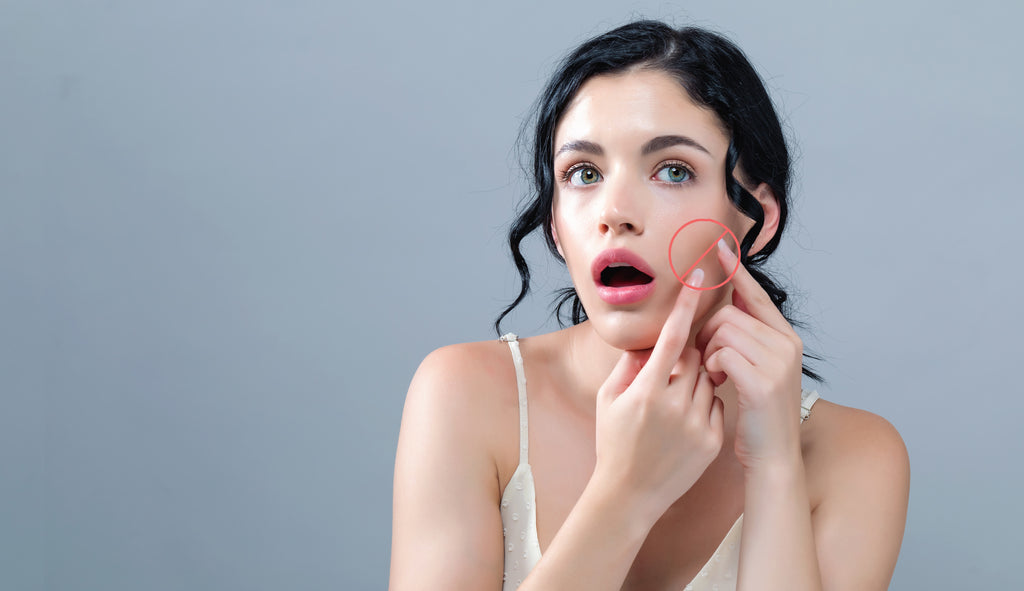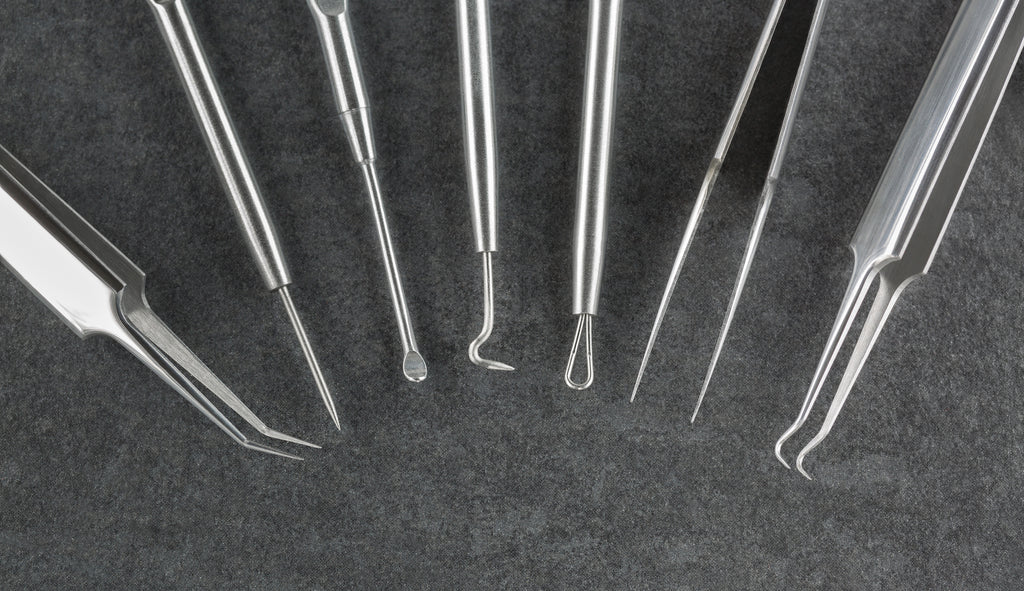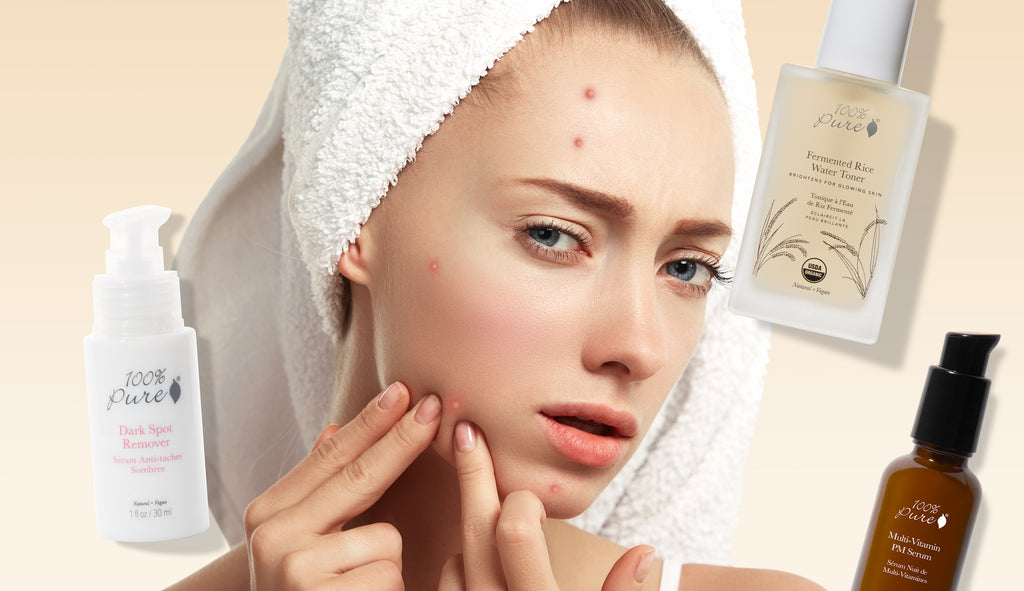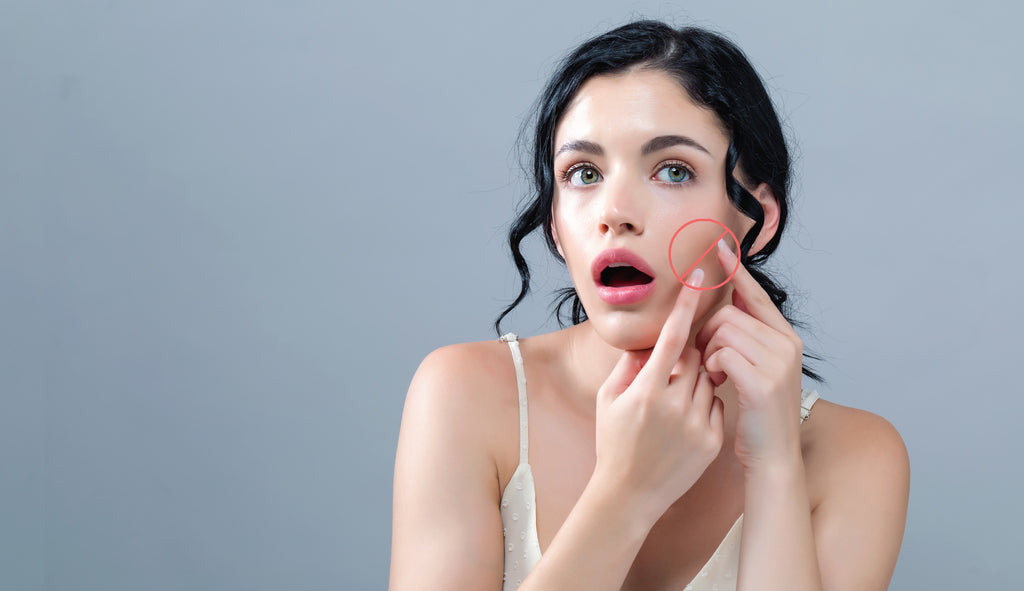Skin-damaging mistakes and practices, plus an acne dark spot remover that can help repair scarring
Posted on January 13, 2024 Written by: 100% PURE ®

Stop right now and drop your weapons, and by weapons, we mean your fingers. When it comes to skincare and our skin, we don’t usually take risks – and the includes the age-old pimple squeezing with your fingers! We stick to what works and treat our complexion with careful practices and tools and healthy skincare, in the hopes that it will return the favor. But when we have a breakout, we’ll admit it’s almost impossible to control our urge to pick!
Whether big or small, pimples are uncomfortable and make us totally self-conscious – like there’s a flashing, neon arrow following us around all week, pointing right at it. Well, guess what? Using fingers or the wrong tools to pick at it will create an even BIGGER problem! Here’s our list of the 10 commandments of pimple care, plus do’s and don’ts, and a nighttime acne dark spot remover to help get rid of those breakouts faster and safer.
Consider these 10 commandments the ‘sins’ of treating pimples. They’re damaging to the skin, painful, can cause scarring, and may even make your pimples worse. Without further ado, thou shalt not:
#1. Squeeze Too Hard
When we have a pimple and we squeeze, it’s almost like we’re attacking our skin. The pressure and the pinch can cause microscopic tears, redness, bruising and overall discomfort, creating even more damage than the pimple itself. So, naturally, the harder you squeeze, the worse off your pimple will be! This may also lead to scarring.
Ensure you’re using gentle pressure with the padding of your fingers (no nails), and only popping when the pimple has really reared its ugly ‘head’. When a breakout comes to a head and is ready to be popped, the center of the pimple will go from red and inflamed to a slight peak with usually a white or lighter colored center. Treat your breakout with kid gloves (almost literally) and you’ll better preserve the sanctity of your skin.
#2. Pick During Healing
We see this all the time. We’ve popped a pimple, it’s starting to heal, and the edges of the previous breakout start to flake up. The texture is somewhat unsightly and we’re tempted to just rip off that dead skin. Well, it’s not just dead skin; it’s the protective barrier or pimple scab that’s helping to heal the breakout underneath the surface. Without it, we’re re-exposing the pimple we popped and possibly creating another (worse) breakout.
Instead of picking at the healing pimple, use a fine exfoliant to gently clear away any dead skin that is ready to come off. This creates a polished edge and helps the pimple heal naturally overtime. Of course, the better the exfoliant, the better the outcome will be for healing the area. Our is a gentle facial scrub that uses all-natural berries to exfoliate the skin. The AHA Fruit Acids blend also works to exfoliate and soften the skin, while papain helps to soothe and reduce inflammation.
#3. Smother Inflammation with Makeup
So, we have a breakout and we’re not feeling like we look our best. What’s our first instinct? To add makeup. And then add more makeup. And then add more makeup on top of that to really cover the lumps and bumps. Instead of layering on concealer when you’re trying to hide unsightly pimples, try adding essential oils and skin products that help treat the problem itself.
Dab on tea tree oil overnight which helps kill the bacteria that’s causing the pimple. Our can be used at night (and during the day) to spot treat pimples. This highly active formula packs a pimple punch with tea tree and witch hazel to make quick work of fast-growing pimples. Peppermint and eucalyptus oils help to reduce acne-causing bacteria and prevent future breakouts, while neem oil reduces the risk of acne scars.
If you must wear makeup, dab a layer (not many) of a to mask redness, and then go in with a clean lip brush and lightly dust around the edges of the pimple with to slightly diffuse the discoloration.
#4. Neglect a Healthy Skincare Routine
Skin commandment #4: Good skin starts with good skincare. During the day, scout the enemy territory and fight back with natural acne products featuring tea tree! Your pimple-destroy mission starts with our , an ultra-refreshing cleanser for removing surface impurities from the skin without over-stripping natural lipids. Follow with our to soothe and clarify acne-prone skin while fighting future breakouts. Don’t forget that even blemish-prone and oily skin types need moisture to balance to restore the balance of your sebum levels and keep oiliness at bay. Our effectively hydrates and balances skin with omega fatty acids, while turmeric lessens the appearance of acne scars.
#5. Touch with Dirty Hands
When we realize we’re breaking out, what’s one of our first reactions? We generally touch and squeeze and pinch and further inflame the area. It’s best practice for good skin care to avoid touching it altogether. Most often even if our hands are clean, we’re transferring some degree of bacteria to our face, and that’s the opposite of what we want to do to a breakout.
If we must touch, it’s best to use clean and sanitized hands when our skin is also clean and makeup-free. Go in with a natural toner for your afterwards to be safe – and to have a clean slate again!

#6. Use Metal Popping Tools
Some of us may have heard of a social media famous doctor nicknamed Dr. Pimple Popper, who’s famous for wowing her audience with some pretty extreme pops. We can put on gloves and a white coat, but we are no doctors. It’s best to leave the use of metal skincare tools to the professionals. It’s easy to misuse them, exert too much pressure, and end up damaging our skin.
#7. Pinch with Dirty Fingernails
Piggybacking off our last commandment, we never want to pop our pimples or touch them with our fingernails as well. Even for fingernails that we’ve recently cleaned, there’s bacteria under there that we just can’t see. It’s best to keep the fingernails away from our inflamed skin as much as possible. Leaving fingernail indentations behind is bad for business. Plus, if you’re not careful, broken capillaries or scars could become your new constant companion.
#8. Apply A Hot Compress
Ah, the soothing feeling of a nice facial steam. We love doing this just before a scrub to get extra clean, radiant skin. When we have a breakout, we may think it’s also wise to apply a hot compress to encourage the pimple to work itself out. This technique doesn’t work, and can actually irritate a bump worse and create even more inflammation on the area. It’s fine to apply a little heat to a pimple that’s ready to pop, but not before and certainly not after.
#9. Use Drying Ingredients on a Spot
The use of astringents with alcohol or the use of rubbing alcohol itself to dry out a pimple doesn’t always help. For those with oily skin, this treatment may seem like it would balance skin out. However, in contrast, harsh, drying alcohol alone or in traditional astringents dries skin out even more and worsens the pimple. Inciting dryness can prevent the pimple from fully forming, which means we can’t treat it to get rid of it.
#10. Put Toothpaste on a Blemish
You know that annoying buzzer and big, orange ‘X’ when the answer is wrong on Family Feud? That’s what you should be hearing in your head. Please don’t put something meant for your teeth on your acne blemish. Toothpaste is a potent, plague-removing, and whitening wonder to be sure – but it isn’t designed for your delicate skin. Thanks for playing!
Adapting a healthy, natural skincare routine and being consistent with it is – let’s just say – like the golden commandment. Most everything, from maintaining a glowing, clear complexion to keeping breakouts at bay, starts and ends with proper skincare – and sun protection during the day!
But if you’re suffering from constant breakouts and acne, having a routine is best for you. If the three steps described earlier of cleanse, tone, and moisturize aren’t enough, we recommend adding on our that contains rosemary and witch hazel to gently balance and clear skin. Unlike other blemish treatments, this mask is non-stripping and nourishing for skin, made with plant ceramides and hyaluronic acid to feed skin with soothing hydration.
For treating acne dark spots, you’ll want a little bit of vitamin C to help lighten them. The does just the trick, with a powerhouse of vitamin C and retinol to brighten and even skin while you sleep. Its high dose of retinol resurfaces skin and purges pores of the excess dirt, debris, and dead skin cells that can cause pore blockages and related acne.
As an additional dark spot remover for stubborn acne spots or deeper complexions, try our serum. This vegan formula contains vitamin C, sake and aloe, which are all ingredients proven to assist in skin cell turnover and repair for rapidly improved skin. Matsutake mushroom extract and lime work to help brighten acne scars naturally, without harsh skin lighteners that are actually your frenemies – they can often make the problem worse by irritating your skin with chemicals and bleaching agents.

How can I determine if a product is non-comedogenic?
To determine if a product is non-comedogenic, first look for “non-comedogenic” labeling on the packaging. While not regulated, it indicates the product is less likely to clog pores. Secondly, check the ingredient list for known comedogenic substances, such as sulfates, fragrances, certain dyes or colorants, PEGs, and parabens.
What should I do if a product exacerbates my acne or causes pimples?
If a product inflames your skin and causes breakouts, there are a few steps you can take. First, discontinue the use of the product immediately. Next, revert to your previous skincare routine to allow your skin to recover. If necessary, consult a dermatologist who can provide personalized guidance and recommend alternative products suitable for your skin type.
Can a product cause pimples even if it doesn’t contain these comedogenic ingredients?
Yes, a product can cause breakouts even if it doesn’t contain known comedogenic ingredients. While certain substances are more likely to clog pores, everyone’s skin is unique and may react differently to various ingredients. For instance, sensitive and reactive skin types may react adversely to peppermint essential oil, while other types may have no reaction.
How long should I test a product before deciding it’s causing pimples?
The timeframe for testing a product to determine if it’s causing breakouts can vary. It’s recommended to test a new product for at least 2-4 weeks, as this allows sufficient time for your skin to adjust and for any potential reactions to show.
Can what I eat cause pimples?
Most of us have heard if you eat chocolate, you’ll get pimples, and were scared off by it (kind of). While a dabble in chocolate won’t necessarily cause breakouts, your diet can cause pimples. Frequent consumption of foods high in sugar or fat and eating lots of refined carbohydrates can increase blood sugar and contribute to the development of pimples.
Understanding the role of skincare and what part you play is vital for achieving clear, healthy skin. Now that we covered the 10 commandments of ‘thou shalt not’ to your pimples, you now play a fundamental role in your skin goals and success. The rest is up to a consistent, gentle yet effective skincare routine to keep those lumpy and bumpy skin sinners down where they belong so you can present your best self.
By incorporating beneficial ingredients like tea tree oil and witch hazel, you can also help to control breakouts and pesky pimples. Remember to closely examine product labels, familiarize yourself with comedogenic ingredients, and maintain a natural skincare routine with the best acne treatments. Stay patient, consistent, and true to your skin because – as you know – in the end, it will be all worth it!




